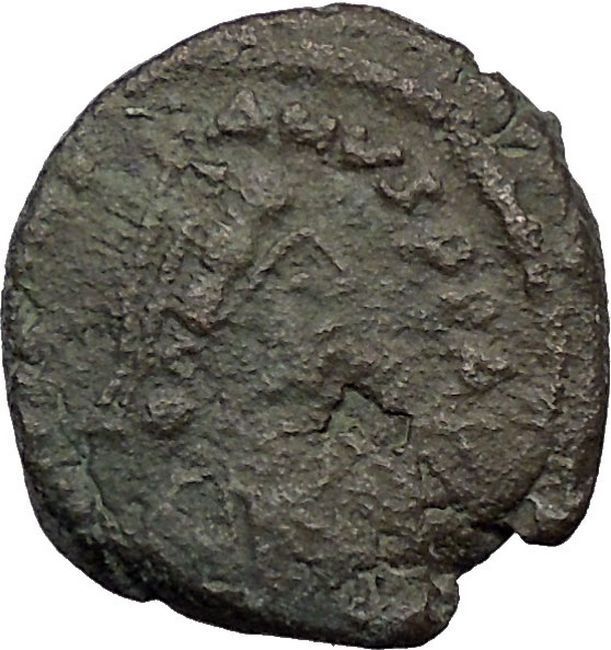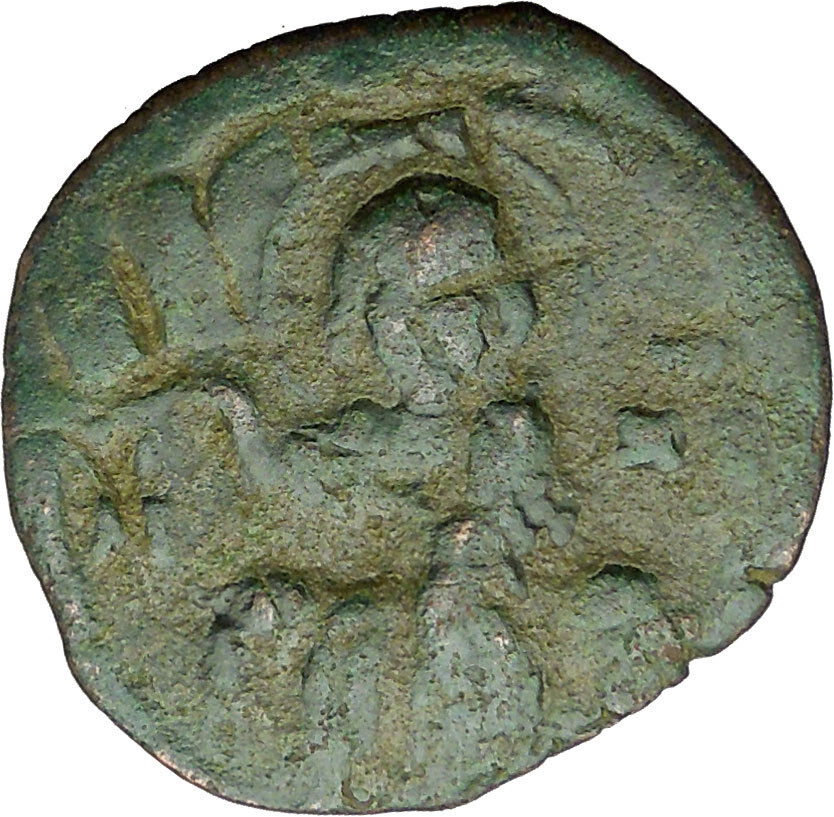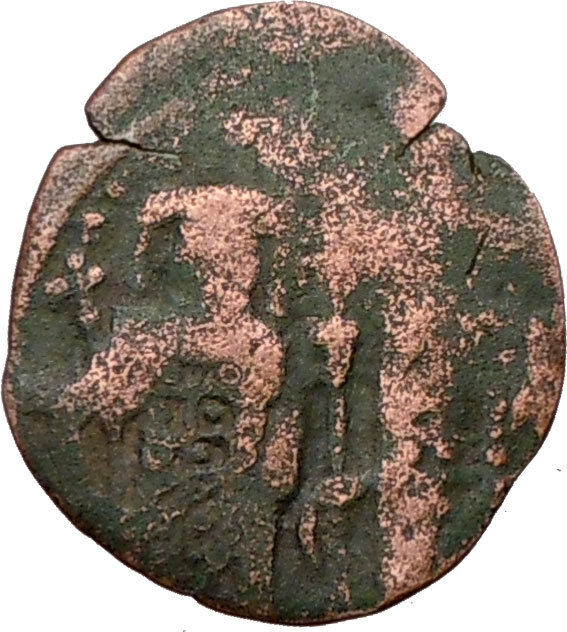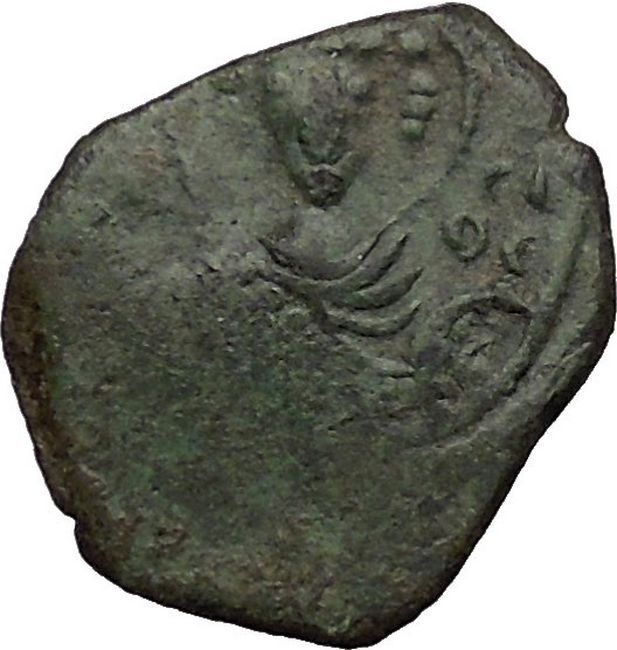|
Byzantine Empire – Anonymous Class B
Bronze Follis 32mm (10.04 grams) Struck circa 1028-1042 A.D.
Reference: Sear 1823
Bust of Christ facing , wearing a nimbus crown, pallium and colobium, and holding book of Gospels with both hands.
Cross, with pellet at each extremity, standing on three steps; in field, above transverse limbs of cross, IS -XS; beneath limbs, bAS – ILЄ, bAS – ILЄ (“Jesus Christ King of Kings”).
For more than a century, the production of Follis denomination Byzantine coins had religious Christian motifs which included included Jesus Christ, and even Virgin Mary. These coins were designed to honor Christ and recognize the subservient role of the Byzantine emperor, with many of the reverse inscriptions translating to “Jesus Christ King of Kings” and “May Jesus Christ Conquer”. The Follis denomination coins were the largest bronze denomination coins issued by the Byzantine empire, and their large size, along with the Christian motif make them a popular coin type for collectors. This series ran from the period of Byzantine emperors John I (969-976 A.D.) to Alexius I (1081-1118 A.D.). The accepted classification was originally devised by Miss Margaret Thompson with her study of these types of coins. World famous numismatic author, David R. Sear adopted this classification system for his book entitled, Byzantine Coins and Their Values. The references about this coin site Mr. Sear’s book by the number that they appear in that work. The class types of coins included Class A1, Class A2, Class A3, Class B, Class C, Class D, Class E, Class F, Class G, Class H, Class I, Class J, Class K.
-
Read the JESUS CHRIST Anonymous Class A-N Byzantine Follis Coins Reference and Guide
-
See ALL the Jesus Christ Anonymous Follis coins for sale.
-
See ALL coins bearing Jesus Christ or related available for sale.
You are bidding on the exact item pictured, provided with a Certificate of Authenticity and Lifetime Guarantee of Authenticity.
 Jesus (7-2 BC to AD 30-33), also referred to as Jesus of Nazareth or Jesus Christ, is the central figure of Christianity, whom the teachings of most Christian denominations hold to be the Son of God. Christians believe Jesus is the awaited Messiah (or Christ, the Anointed One) of the Old Testament. Jesus (7-2 BC to AD 30-33), also referred to as Jesus of Nazareth or Jesus Christ, is the central figure of Christianity, whom the teachings of most Christian denominations hold to be the Son of God. Christians believe Jesus is the awaited Messiah (or Christ, the Anointed One) of the Old Testament.
Virtually all modern scholars of antiquity agree that Jesus existed historically, and historians consider the Synoptic Gospels (Matthew, Mark and Luke) to be the best sources for investigating the historical Jesus. Most scholars agree that Jesus was a Galilean, Jewish rabbi who preached his message orally, was baptized by John the Baptist, and was crucified by the order of the Roman Prefect Pontius Pilate. In the current mainstream view, Jesus was an apocalyptic preacher and the founder of a renewal movement within Judaism, although some prominent scholars argue that he was not apocalyptic. After Jesus’ death, his followers believed he was resurrected, and the community they formed eventually became the Christian church. The widely used calendar era, abbreviated as “AD” from the Latin “Anno Domini” (“in the year of our Lord”) or sometimes as “CE”, is based on the birth of Jesus.
 Christians believe that Jesus has a “unique significance” in the world. Christian doctrines include the beliefs that Jesus was conceived by the Holy Spirit, was born of a virgin named Mary, performed miracles, founded the Church, died by crucifixion as a sacrifice to achieve atonement, rose from the dead, and ascended into Heaven, whence he will return. Most Christians believe Jesus enables humans to be reconciled to God, and will judge the dead either before or after their bodily resurrection, an event tied to the Second Coming of Jesus in Christian eschatology; though some believe Jesus’s role as savior has more existential or societal concerns than the afterlife, and a few notable theologians have suggested that Jesus will bring about a universal reconciliation. The great majority of Christians worship Jesus as the incarnation of God the Son, the second of three persons of a Divine Trinity. A few Christian groups reject Trinitarianism, wholly or partly, as non-scriptural. Christians believe that Jesus has a “unique significance” in the world. Christian doctrines include the beliefs that Jesus was conceived by the Holy Spirit, was born of a virgin named Mary, performed miracles, founded the Church, died by crucifixion as a sacrifice to achieve atonement, rose from the dead, and ascended into Heaven, whence he will return. Most Christians believe Jesus enables humans to be reconciled to God, and will judge the dead either before or after their bodily resurrection, an event tied to the Second Coming of Jesus in Christian eschatology; though some believe Jesus’s role as savior has more existential or societal concerns than the afterlife, and a few notable theologians have suggested that Jesus will bring about a universal reconciliation. The great majority of Christians worship Jesus as the incarnation of God the Son, the second of three persons of a Divine Trinity. A few Christian groups reject Trinitarianism, wholly or partly, as non-scriptural.
In Islam, Jesus (commonly transliterated as Isa) is considered one of God’s important prophets and the Messiah, second in importance only to Muhammad. To Muslims, Jesus was a bringer of scripture and was born of a virgin, but was not the Son of God. According to the Quran, Jesus was not crucified but was physically raised into Heaven by God. Judaism rejects the belief that Jesus was the awaited Messiah, arguing that he did not fulfill the Messianic prophecies in the Tanakh.
|





 Jesus (7-2 BC to AD 30-33), also referred to as Jesus of Nazareth or Jesus Christ, is the central figure of Christianity, whom the teachings of most Christian denominations hold to be the Son of God. Christians believe Jesus is the awaited Messiah (or Christ, the Anointed One) of the Old Testament.
Jesus (7-2 BC to AD 30-33), also referred to as Jesus of Nazareth or Jesus Christ, is the central figure of Christianity, whom the teachings of most Christian denominations hold to be the Son of God. Christians believe Jesus is the awaited Messiah (or Christ, the Anointed One) of the Old Testament. Christians believe that Jesus has a “unique significance” in the world. Christian doctrines include the beliefs that Jesus was conceived by the Holy Spirit, was born of a virgin named Mary, performed miracles, founded the Church, died by crucifixion as a sacrifice to achieve atonement, rose from the dead, and ascended into Heaven, whence he will return. Most Christians believe Jesus enables humans to be reconciled to God, and will judge the dead either before or after their bodily resurrection, an event tied to the Second Coming of Jesus in Christian eschatology; though some believe Jesus’s role as savior has more existential or societal concerns than the afterlife, and a few notable theologians have suggested that Jesus will bring about a universal reconciliation. The great majority of Christians worship Jesus as the incarnation of God the Son, the second of three persons of a Divine Trinity. A few Christian groups reject Trinitarianism, wholly or partly, as non-scriptural.
Christians believe that Jesus has a “unique significance” in the world. Christian doctrines include the beliefs that Jesus was conceived by the Holy Spirit, was born of a virgin named Mary, performed miracles, founded the Church, died by crucifixion as a sacrifice to achieve atonement, rose from the dead, and ascended into Heaven, whence he will return. Most Christians believe Jesus enables humans to be reconciled to God, and will judge the dead either before or after their bodily resurrection, an event tied to the Second Coming of Jesus in Christian eschatology; though some believe Jesus’s role as savior has more existential or societal concerns than the afterlife, and a few notable theologians have suggested that Jesus will bring about a universal reconciliation. The great majority of Christians worship Jesus as the incarnation of God the Son, the second of three persons of a Divine Trinity. A few Christian groups reject Trinitarianism, wholly or partly, as non-scriptural.




